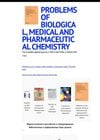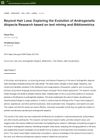1 citations,
February 2023 in “Plants” BB4CMU rice bran oil may help treat hair loss and gray hair.
1 citations,
December 2022 in “Applied Sciences” 1 citations,
December 2022 in “Plants” CSLD1 suppresses rice root hair growth with NH4+ and regulates AMT1;2 expression.
 1 citations,
December 2022 in “Actas dermo-sifiliográficas/Actas dermo-sifiliográficas”
1 citations,
December 2022 in “Actas dermo-sifiliográficas/Actas dermo-sifiliográficas” Sensitive scalp causes discomfort and hair loss, treated with personalized care.
 1 citations,
July 2022 in “International Journal of Environmental Research and Public Health”
1 citations,
July 2022 in “International Journal of Environmental Research and Public Health” In Poland, people search more for certain skin conditions depending on the season, and despite more STD infections, searches for them have decreased, suggesting a need for better sexual education.
 1 citations,
July 2022 in “PLOS ONE”
1 citations,
July 2022 in “PLOS ONE” The study concluded that people with Lichen Planopilaris have a more diverse scalp bacteria and different metabolic pathways compared to healthy individuals.
 1 citations,
June 2021 in “Journal of gynecology and womens health”
1 citations,
June 2021 in “Journal of gynecology and womens health” The study found that PCOS affects about 6.5-6.8% of women in both urban and rural areas of Telangana, India, and highlighted the importance of lifestyle changes for management.
1 citations,
January 2018 in “Journal of microscopy and ultrastructure” The method can identify minerals in hair from water, and using coconut oil or conditioner can prevent mineral buildup.
 1 citations,
May 2006 in “Thyroid Research and Practice”
1 citations,
May 2006 in “Thyroid Research and Practice” Skin can become dry and thick in hypothyroidism.
1 citations,
January 2023 in “IntechOpen eBooks” Paclitaxel is an effective cancer drug with side effects and potential new uses beyond cancer.
 December 2024 in “Problems of Biological Medical and Pharmaceutical Chemistry”
December 2024 in “Problems of Biological Medical and Pharmaceutical Chemistry” Students from the Middle East and Moscow have different hair element levels due to their environments.
 November 2024 in “Applied Sciences”
November 2024 in “Applied Sciences” Placenta products might help with hair loss, but more research is needed.
 November 2024 in “Plants”
November 2024 in “Plants” Et-BB3-CMU rice bran extract may be a promising natural option for promoting hair growth and preventing hair loss.
 October 2024 in “Cosmoderma”
October 2024 in “Cosmoderma” Proper hair care and suitable products are essential for men's scalp health and well-being.
 September 2024 in “International Journal of Molecular Sciences”
September 2024 in “International Journal of Molecular Sciences” Hydrangea serrata extract may promote hair growth and improve hair health.
 September 2024 in “Archiv Euromedica”
September 2024 in “Archiv Euromedica” Trichoscopy is a quick, accurate, and non-invasive method to diagnose and treat non-scarring hair loss.
September 2024 in “Fitoterapia” Camellia oleifera seed shell polyphenols and 1,3,6-tri-O-galloylglucose can help treat hair loss by reducing certain hormones and promoting hair growth.
 August 2024 in “Applied Sciences”
August 2024 in “Applied Sciences” Plant extracts may help prevent or reverse hair graying.
 August 2024 in “The Journal of Urology”
August 2024 in “The Journal of Urology” The 2024 guideline updates recommendations for genetic testing, imaging, and sperm retrieval in male infertility.
 July 2024 in “Journal of Education For Sustainable Innovation”
July 2024 in “Journal of Education For Sustainable Innovation” Visualizing data helps guide future androgenetic alopecia research and policies.
May 2024 in “International journal of molecular sciences” Platelet-derived products help regenerate tissue and are used in various skin and hair treatments.
May 2024 in “Molecules/Molecules online/Molecules annual” Plant extracts can help prevent hair loss and promote hair growth.
Polyglutamic acid is a valuable, sustainable ingredient for skincare and haircare products.
May 2024 in “Frontiers in Nutrition” Turning food waste into useful products is key for a sustainable economy.
 May 2024 in “Clinical Cosmetic and Investigational Dermatology”
May 2024 in “Clinical Cosmetic and Investigational Dermatology” Manipulating cell cleanup processes could help treat hair loss.
April 2024 in “International journal of molecular sciences” Light-based treatment, Photobiomodulation, shows promise for non-invasive skin therapy with few side effects.
March 2024 in “Agriculture” CRISPR/Cas9 gene-editing shows promise for improving sheep and goat breeding but faces challenges with efficiency and accuracy.
 February 2024 in “International Journal of Molecular Sciences”
February 2024 in “International Journal of Molecular Sciences” Hair loss in Androgenetic Alopecia is caused by genetics, aging, and lifestyle, leading to hair follicle shrinkage and related health risks.
 January 2024 in “Collagen and leather”
January 2024 in “Collagen and leather” The conclusion is that using bovine milk permeate to remove wool from sheepskins is eco-friendly and results in smoother, higher quality leather compared to traditional sulfide methods.
January 2024 in “Cosmetics” Menopause worsens skin, hair, and nails, affecting self-esteem and quality of life.
















